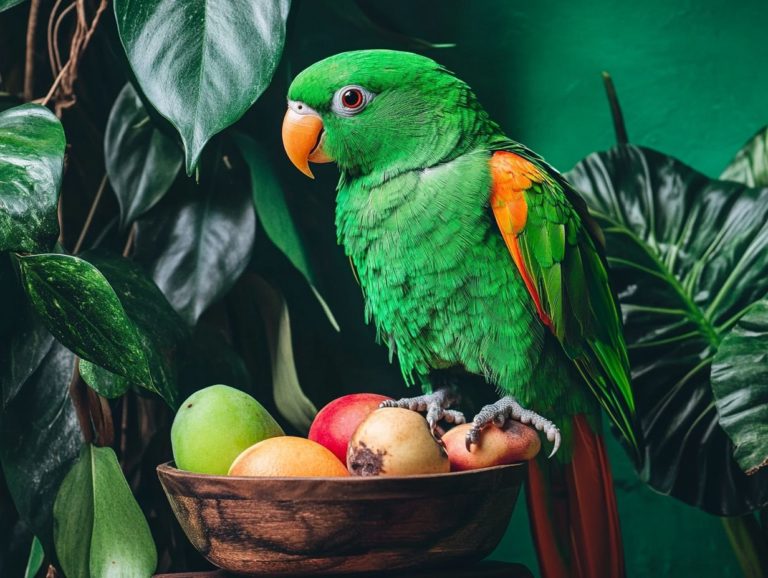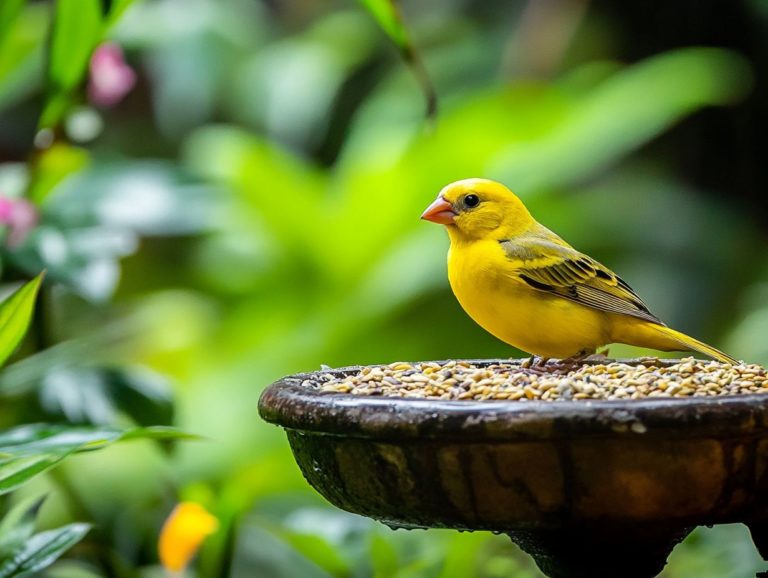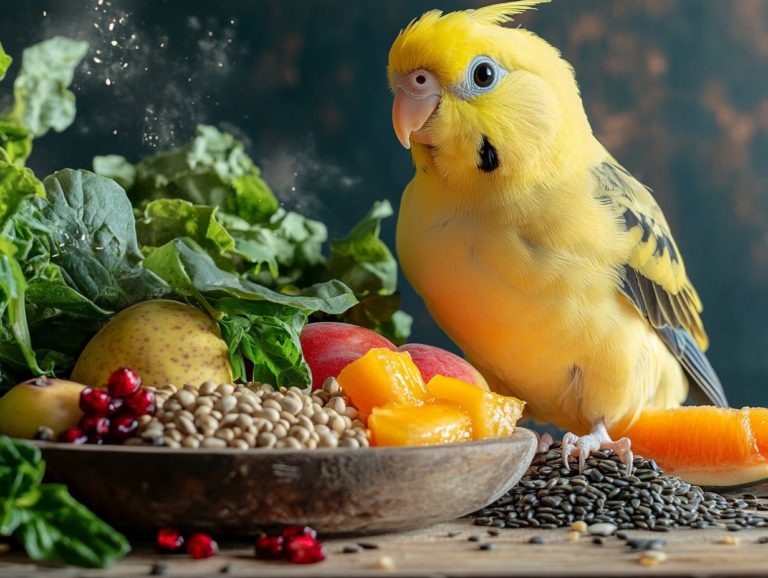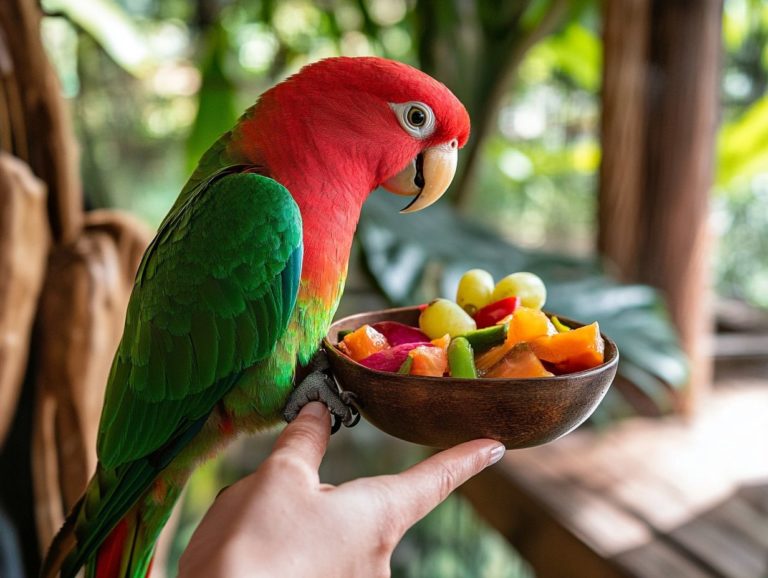How to Identify Health Issues in Budgies
Budgerigars are vibrant, affectionate companions that bring joy to countless households. Like all pets, they can face health challenges. Recognizing signs of illness both physical and behavioral is essential for ensuring your feathered friend stays happy and healthy.
This article explores common health issues that budgerigars may encounter, such as respiratory infections, feather and skin problems, and digestive issues. It highlights preventive measures, including a balanced diet and regular vet check-ups, to help your budgie not just survive but truly thrive.
Contents
- Key Takeaways:
- Common Health Issues in Budgies
- Signs of Illness in Budgies
- Common Health Issues in Budgies
- Preventing Health Issues in Budgies
- Frequently Asked Questions
- 1. How can I identify health issues in my budgerigar?
- 2. What are some common health issues that affect budgerigars?
- 3. How can I tell if my budgie is having trouble breathing?
- 4. What should I do if I suspect my budgie has a health issue?
- 5. How can I prevent health issues in my budgie?
- 6. Can I use a reference guide to help identify health issues in my budgie?
Key Takeaways:
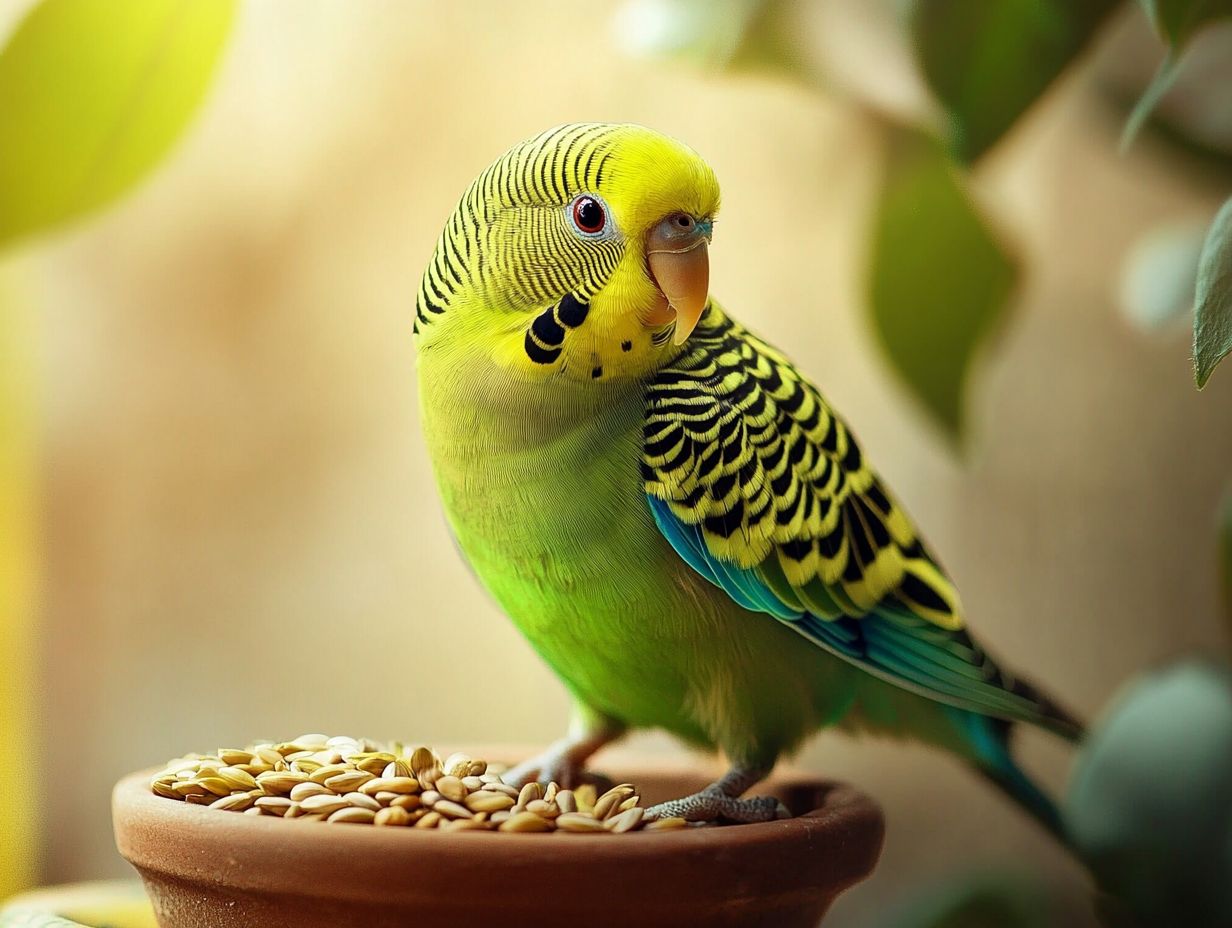
- Observe changes in your budgie s physical and behavioral traits to spot signs of illness. Common indicators include changes in appetite, breathing, and activity levels.
- Respiratory infections, feather and skin issues, and digestive problems are common health concerns. Immediate attention and proper treatment are necessary.
- Prevent health issues by providing a proper diet and a clean, safe environment. Regular vet check-ups help catch problems early.
Common Health Issues in Budgies
Common health issues in budgerigars, or budgies, often arise from diseases and infections, such as a respiratory infection and Avian Gastric Yeast. These can significantly affect their well-being and behavior. Many complications stem from poor living conditions, inadequate diet, or hygiene practices, leading to concerning symptoms like vomiting, weight loss, and dehydration.
As a parakeet owner, knowing these health challenges can make a huge difference for your budgie. By providing timely veterinary care and closely monitoring your bird’s behavior, droppings consistency, and feather condition, you enhance their chances of recovery from illnesses like sour crop and candidiasis.
Proactively addressing these issues helps you avoid serious complications like respiratory infections and conditions caused by Avian Gastric Yeast.
Signs of Illness in Budgies
Identifying subtle signs of illness in budgerigars requires keen observation of their physical and behavioral traits. These indicators often reveal underlying health concerns, including stress and vitamin deficiency. To better understand these signs, refer to resources on understanding bird behavior: health indicators. Look for common symptoms such as changes in droppings consistency, a sudden loss of appetite, or unusual behaviors like listlessness or unexpected aggression that might signal illnesses.
Regularly monitoring your parakeet s health while getting to know their typical behavior is crucial. This vigilance ensures you can seek timely veterinary care, ultimately safeguarding their well-being and recovery.
Physical and Behavioral Indicators
Physical and behavioral indicators are essential for assessing your budgerigar‘s health. Even subtle changes can point to potential issues, including respiratory infections. By observing your bird s appetite, feather condition, and droppings, you can identify signs of illness such as weight loss, dehydration, or infections like candidiasis.
Any shifts in behavior, like increased aggression or splayed feet, could indicate stress or discomfort, signaling the need for examination and possibly veterinary intervention.
Maintaining a daily log of these changes can be invaluable during vet visits, especially when diagnosing potential diseases. For example, alterations in your bird’s vocalization patterns or social interactions might hint at emotional distress or illness.
Regularly monitoring your budgerigar’s activity levels and grooming habits helps establish a baseline for their normal behavior. This makes it easier to notice deviations. By documenting these observations, you’ll provide your veterinarian with detailed information, enhancing their ability to offer accurate diagnoses and effective treatment.
Common Health Issues in Budgies
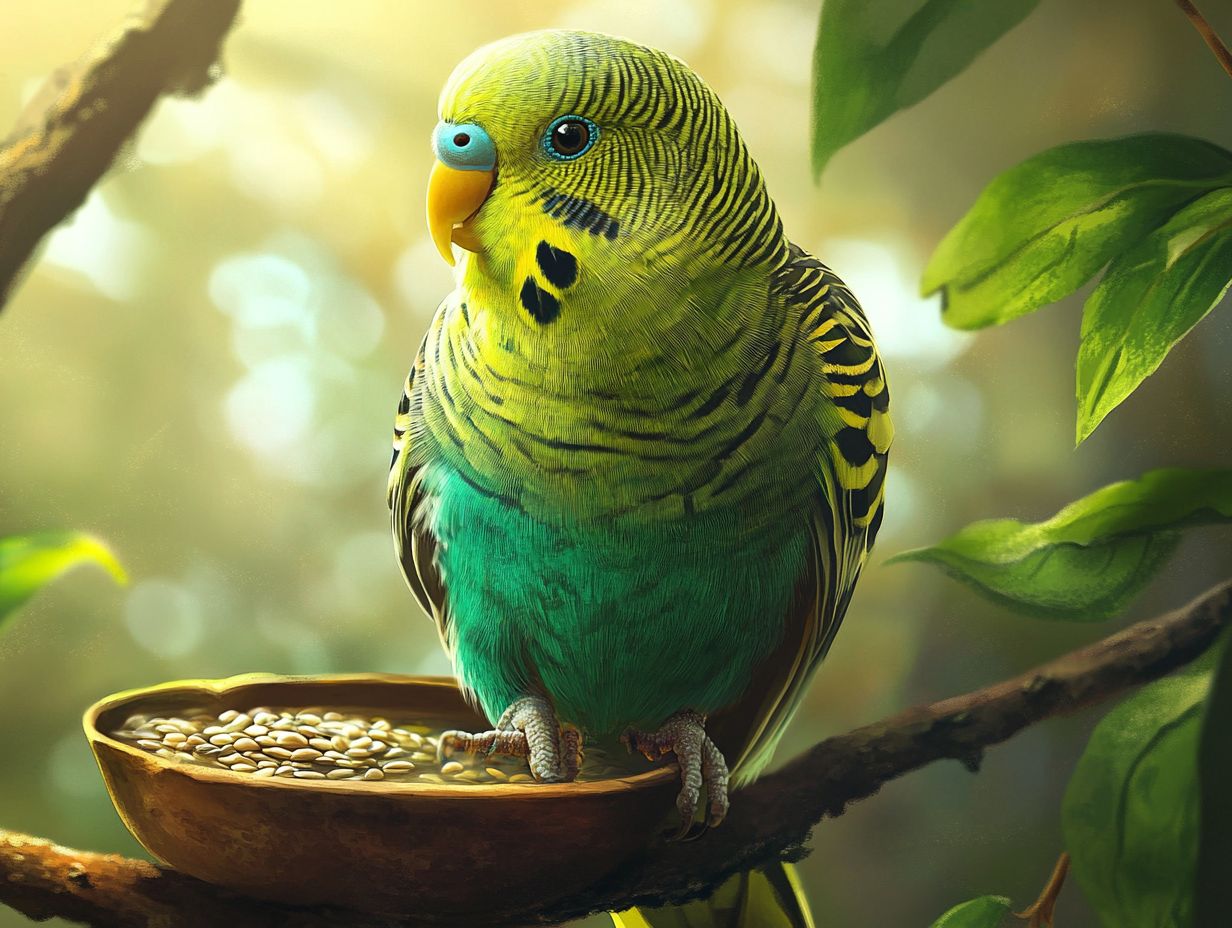
Health issues in budgies can appear in various ways, potentially affecting their breathing, digestion, and feather conditions. To better understand these problems, it’s important to learn how to spot nutritional deficiencies in birds.
Common concerns include respiratory infections and digestive disorders. Watch for changes in droppings or loss of appetite to help catch these issues early.
Respiratory Problems
Respiratory problems are among the most common for budgies. Look for signs like open-mouth breathing, lethargy, or reduced appetite.
These could indicate serious distress and may require antibiotics. Stress factors like poor airflow, secondhand smoke, or sudden temperature changes can worsen these issues.
As a budgie owner, stay alert and seek vet care at the first sign of symptoms. Your vet may suggest treatments like humidifiers or oxygen to aid recovery.
Keeping a clean environment and providing a balanced diet can significantly improve your budgie’s breathing health.
Feather and Skin Issues
Feather and skin issues can signal underlying health problems. Look for signs like feather plucking or changes in feather quality.
These issues can cause discomfort and stress for your budgie. Spotting them early is key, so consult an avian vet to learn about common pet bird health concerns and ensure your pet stays healthy and happy.
Notice changes in behavior, such as increased lethargy or irritability, as they can provide vital insights into your budgie s well-being. Causes of these issues may include nutritional deficiencies or environmental stressors.
For treatment, provide a balanced diet rich in vitamins. Regular baths can keep their feathers healthy and hydrated.
With attentive care, you can effectively manage feather-related issues. Your budgie will thrive in a happy and healthy environment!
Digestive Problems
Digestive issues in your budgerigar can create notable health challenges, often presenting as problems like sour crop or yeast infections from Candida. Symptoms include vomiting, weight loss, and changes in droppings, all of which can adversely affect your bird’s overall well-being.
Act fast to identify and treat these issues to keep your budgie healthy! This typically involves dietary adjustments like incorporating fresh fruits and vegetables, along with veterinary care to ensure recovery and maintain good digestive health.
Your avian companion may encounter various digestive concerns, including bacterial infections or an overgrowth of harmful bacteria in the gut. Look for signs like lethargy, ruffled feathers, or a reluctance to eat, as these may indicate digestive health struggles.
A primary cause of these digestive troubles often stems from diet. Incorrect food choices, insufficient fiber, or spoiled seeds can lead to an upset stomach. Providing a balanced diet rich in fresh fruits, vegetables, and high-quality pellets can significantly reduce the risk of digestive disturbances.
Regular check-ups with an avian vet and careful monitoring of their eating habits play a crucial role in maintaining your budgerigar’s optimal health.
Other Health Concerns
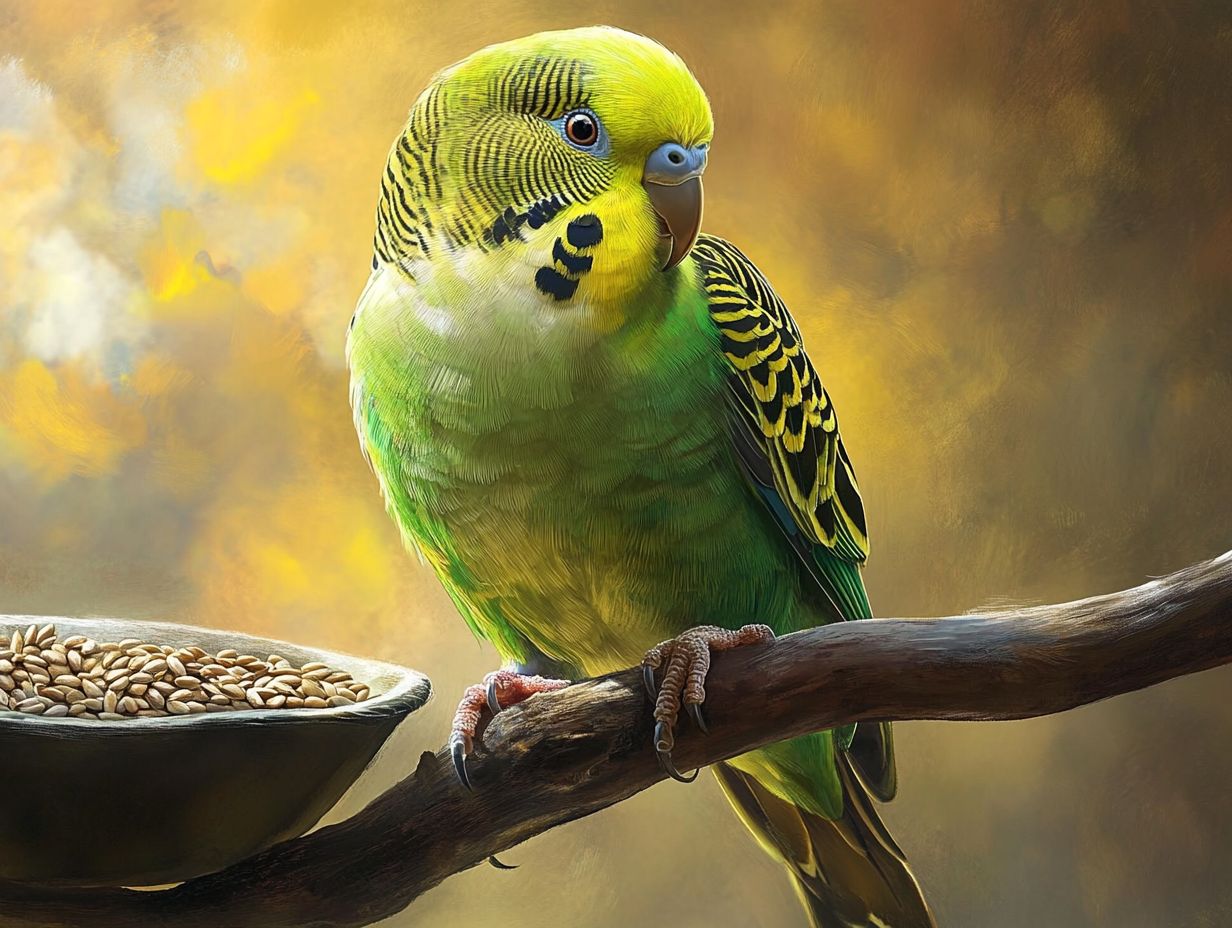
In addition to respiratory, feather, and digestive issues, budgerigars can face various health concerns, including vitamin deficiencies and dehydration, both of which can significantly impact their quality of life. If you notice symptoms like listlessness or changes in behavior such as feather plucking or excessive scratching, address these signs promptly.
Providing proper care, monitoring their environment, and scheduling regular veterinary check-ups are essential steps in preventing health issues, including respiratory or digestive disorders.
Be vigilant for signs of potential concerns, such as feather plucking or excessive scratching, which may suggest skin disorders. A lack of enthusiasm for food could signal nutritional deficiencies or dehydration, worsening existing health issues.
Treatment usually involves dietary adjustments with a balanced diet and supportive care, like creating a humidified environment for those suffering from dehydration.
Enhancing your budgies’ diets with fresh fruits and vegetables rich in essential nutrients is beneficial. Regularly cleaning the cage and maintaining a stress-free atmosphere can further reduce the risk of health complications, ensuring your cherished pets enjoy long, happy lives.
Preventing Health Issues in Budgies
Preventing health issues in budgerigars requires a comprehensive strategy that focuses on a balanced diet, ideal environmental conditions, and consistent veterinary care. By offering high-quality food and maintaining strict hygiene standards, you can greatly diminish the risk of infections like Psittacosis, a common bird illness, or digestive ailments like sour crop. Regular vet visits help monitor for symptoms of behavioral abnormalities and weight loss, allowing for early identification of potential issues.
Creating a stress-free environment for your budgie and ensuring regular health check-ups will enhance their longevity and overall well-being. Monitor your budgie s health and consult a vet when necessary to keep them thriving!
Proper Diet and Environment
Providing a proper diet and maintaining an ideal environment are crucial for the health and well-being of your budgerigars. These factors directly impact their risk of developing health issues. By offering a balanced diet tailored to their nutritional needs and creating an environment that minimizes stressors, you significantly lower the chances of diseases and infections.
Ensuring they have access to fresh food, clean water, and safe living conditions is essential for their overall health.
Budgerigars thrive on a varied diet that includes seeds, pellets, fresh fruits, and vegetables, ensuring they receive vital nutrients like vitamins, minerals, and healthy fats necessary for their growth. Adding leafy greens and occasional treats like millet can greatly enhance their nutritional intake.
Creating a calm home for your budgerigar is also important. A spacious cage equipped with perches, toys, and quiet areas allows them to exercise, explore, and feel secure.
Regularly cleaning their space and maintaining a consistent day-night cycle helps reduce anxiety, fostering a happier, healthier bird.
Regular Vet Check-ups
Regular veterinary check-ups are vital for maintaining the health and well-being of your budgerigar. These visits provide an opportunity for early detection and prevention of potential health issues. During these check-ups, avian vets assess your bird’s overall condition, monitor for signs of disease, and provide tailored advice on care and diet. Keeping up with regular vet visits can significantly enhance your pet’s quality of life and longevity.
You can expect a thorough physical examination during these appointments. The vet will carefully check your budgerigar’s beak, feathers, and weight, helping to identify any abnormalities that might hint at underlying problems. Avian vets also provide vaccinations and discuss important environmental factors that could impact your feathered friend s health, such as diet and cage cleanliness.
By building a relationship with a dedicated veterinarian, you ensure consistent health monitoring while gaining insights into the unique needs of your budgerigar. This proactive approach to care can make a substantial difference in your pet’s overall health and happiness.
Frequently Asked Questions
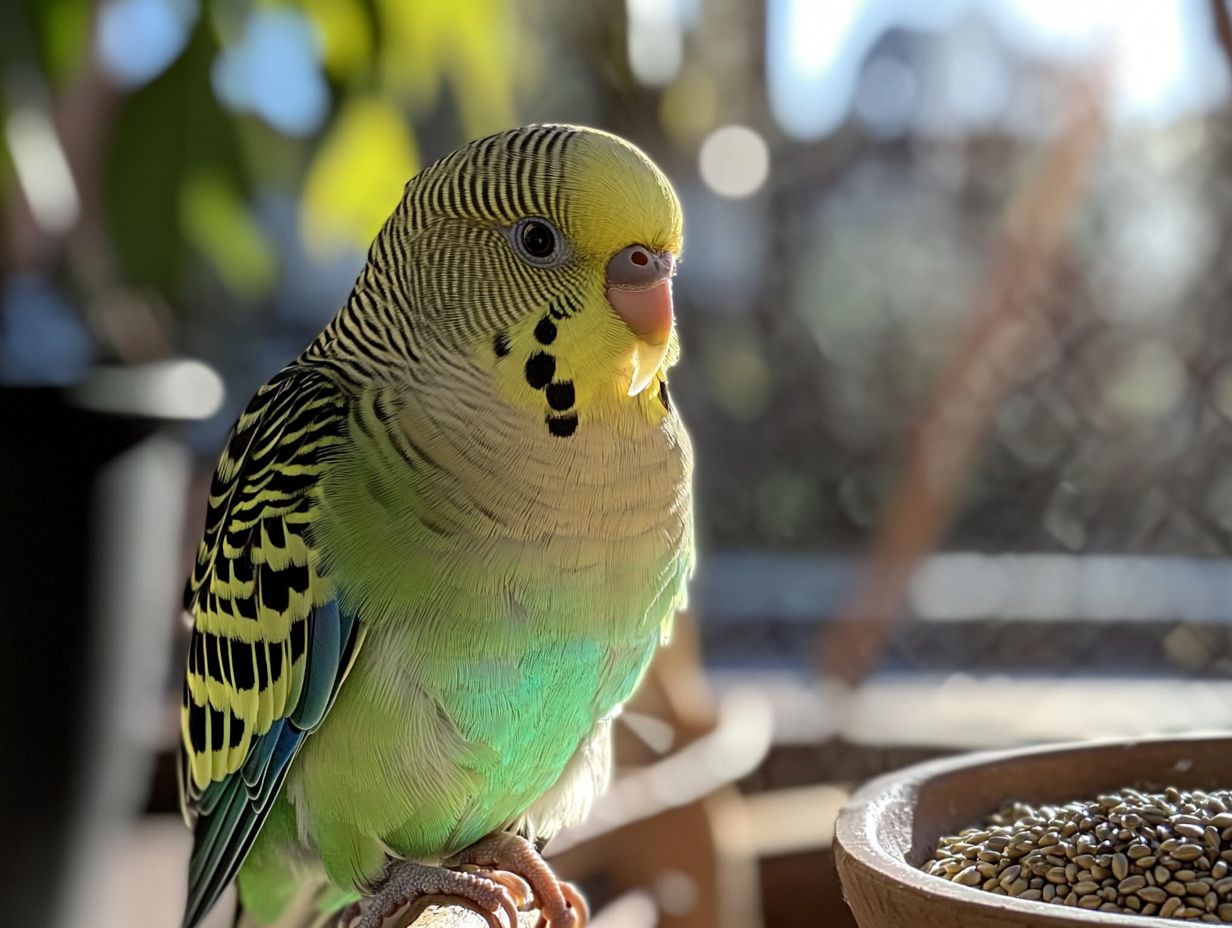
1. How can I identify health issues in my budgerigar?
Keep a close eye on your budgerigar to catch any changes early. Signs to look for that may indicate a health issue include changes in behavior, appearance, or appetite. Regularly observe your bird for any unusual symptoms, including changes in droppings or feather condition that might suggest a more serious illness.
2. What are some common health issues that affect budgerigars?
Budgerigars are susceptible to a variety of health problems, including respiratory infections, feather plucking, malnutrition, and tumors. It is important to be aware of these potential issues and take preventive measures to keep your bird healthy. Certain parakeet diseases, like Psittacosis or Candidiasis, can be particularly concerning and may require specific treatment with antibiotics.
3. How can I tell if my budgie is having trouble breathing?
Look for signs like wheezing, difficulty breathing, or discharge from the nose and eyes. If you see any of these symptoms, contact a vet right away; they could indicate serious health issues.
4. What should I do if I suspect my budgie has a health issue?
If you notice any changes in your budgie’s behavior or appearance, consult a veterinarian. They can check your bird’s droppings (bird poop) and conduct tests for specific yeast infections, such as Avian Gastric Yeast.
5. How can I prevent health issues in my budgie?
To keep your budgie healthy, provide a balanced diet, a clean living environment, and regular vet check-ups. Minimize stress and ensure they get enough exercise. Keeping a list of potential symptoms to watch for can help you stay vigilant about their health.
6. Can I use a reference guide to help identify health issues in my budgie?
Yes! You can use reference guides like books or online resources, or consult a knowledgeable veterinarian to help identify potential health issues. Regularly educating yourself on budgie health ensures the well-being of your bird. Resources like About Birds from Texas A&M provide valuable information on various conditions affecting pet birds.


